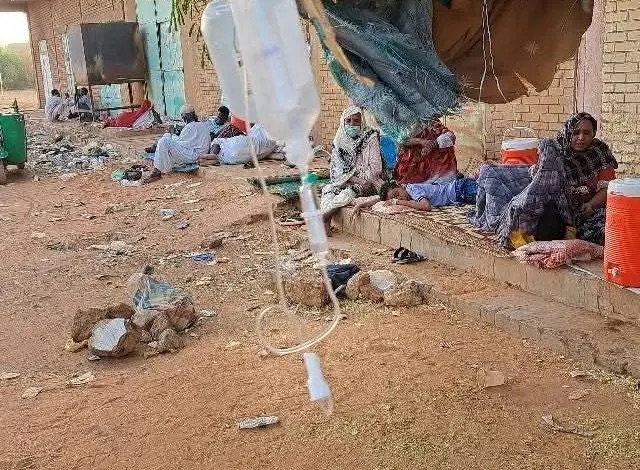An unfamiliar medical condition is rapidly spreading in Sudan… deaths and shocking scenes

The health situation in the Sudanese capital, Khartoum, is rapidly deteriorating due to the spread of severe diarrhea, often accompanied by strange symptoms. This is taking place amidst the notable overcrowding in Isolation Centers, which promptly forced hundreds of infected individuals to receive treatment (infusions) in the surrounding streets.
Evidence regarding the number of infections and deaths is conflicting amidst the state of chaos plaguing the health sector. While the Ministry of Health spoke of an average of (700 infections) per week, independent sources confirmed that daily infections exceed (1,000 cases).
Moreover, the Ministry of Health failed to determine the actual number of deaths, however, volunteers providing assistance to patients indicated (1,500 deaths) take place within the span of three days.
Shocking Scenes
Medical professionals, journalists, and activists have described shocking scenes and catastrophic conditions in Isolation Centers in Omdurman and other areas.
According to journalist Masha’er Ahmed, the scene inside the Isolation Center at Al-Naw Hospital in Omdurman was rather shocking. She shared that she noticed a body lying on the ground at the entrance, adding that “the groans of patients filled the place with pain and suffering. Co-patient were holding on to the IV tubes in their hands due to the lack of tripods. A significant number of patients took refuge in the shade of trees, lying on the ground, suffering through the extremely high temperatures.”
Activist Ghassan Geinaro stated that eyewitnesses confirmed to him that three deaths occur every 10 minutes in Omdurman.
A Number of Causes
Specialists warn of the shortage of medicines and intravenous solutions, the absence of any kind of systematic healthcare, be it intervention, preventive, therapeutic, and diagnostic healthcare as (75%) of hospitals are either completely or partially out of service, whilst the rest are operating with limited capacity and a severe shortage of doctors as well as healthcare workers.
Adiba Al-Sayed, a public health consultant and member of the Sudanese Doctors Syndicate, attributes the alarming rate at whishthe epidemic is spreading to environmental deterioration and the notable collapse of the health sector.
She told (Sky News Arabia), that: “The severity of infections has increased due to water contamination, a change in odor, and the deterioration of nutritional conditions for the vast majority of the population, as part of the disastrous repercussions of the ongoing war.”
“The situation is catastrophic, as the few functioning hospitals lack the necessary capacity, including sufficient medical staff and drug stocks, to address the deteriorating situation,” according to Adiba Al-Sayed.
Based on available information, tests conducted for Cholera have been negative in most cases, indicating the possibility of other types of acute watery diarrhea not specifically linked to Cholera, according to Salam Tutu, a former member of the World Health Organization’s Emergency Medical Committee.
However, Al-Fatih Omar, a consultant and head of the health sector in the Sudanese Congress Party (SCoP), didn’t rule out a link between many of the cases and reports of chemical contamination.
He explained to (Sky News Arabia) that: “There are cases with symptoms similar to those of Cholera, such as diarrhea and vomiting. However, there are strange symptoms that have yet to be diagnosed as well, including congestion, bleeding in the eyes, and skin ulcers. This raises further concerns, given the confirmation that internationally prohibited chemical weapons have been used in the capital, Khartoum, and several other areas.” He added, “The situation is catastrophic and complex,” noting that the number of cases and deaths is significantly higher than reported.





